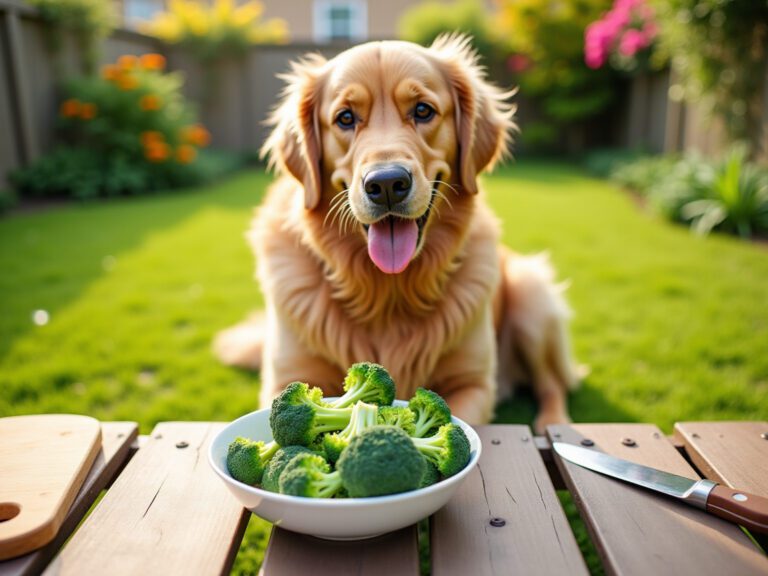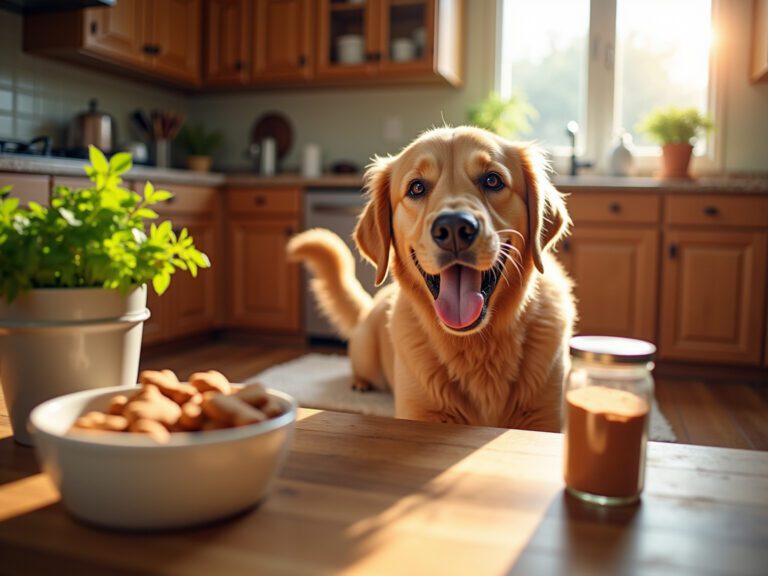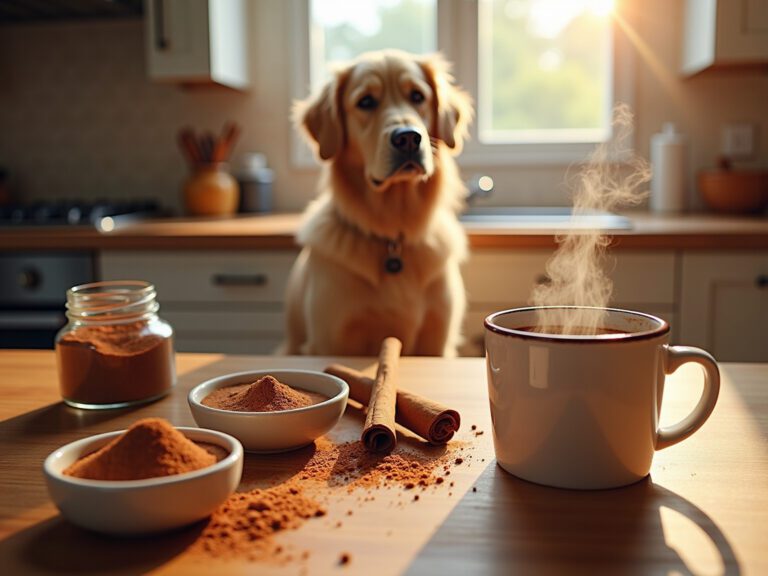4 Steps to Address Dog Stomach Gurgling Effectively
Overview
This article compassionately outlines four effective steps to help you address your dog’s stomach gurgling.
- First, we explore understanding its causes, which is essential for your peace of mind.
- Next, we evaluate symptoms, ensuring you can identify signs that may indicate the need for professional care.
- Then, we guide you on determining when to consult a veterinarian, so you feel confident in your decisions.
- Lastly, we provide practical home remedies that can alleviate mild discomfort, creating a nurturing environment for your furry family member.
Each step is supported by detailed explanations, allowing you to feel well-informed about your dog’s health and well-being.
Introduction
Understanding the sounds that come from your furry family member’s stomach can be a perplexing experience for pet owners. Stomach gurgling, medically known as borborygmi, can signal anything from normal digestion to more serious gastrointestinal issues. This guide offers valuable insights into:
- Identifying the causes of these noises
- Evaluating your dog’s symptoms
- Knowing when to seek veterinary help
But how can you distinguish between harmless gurgling and a sign of distress that requires immediate attention? We’re here to help you navigate these concerns with compassion and care.
Understand the Causes of Stomach Gurgling in Dogs
The phenomenon of dog stomach gurgling, medically known as borborygmi, can arise for a variety of reasons. As a caring pet owner, it’s essential to understand these causes to ensure your furry family members are healthy and comfortable. Common reasons for these sounds include:
- Normal Digestion: Gurgling sounds often indicate that food and gas are moving through the gastrointestinal tract, a normal part of digestion that shows your dog’s system is working well.
- Hunger: If your dog is feeling hungry, you might notice dog stomach gurgling as a gentle reminder that it’s time for nourishment.
- Dietary Issues: Sudden changes in diet, low-quality food, or food intolerances can lead to increased gas and dog stomach gurgling, indicating that your pet may need a dietary adjustment.
- Gastrointestinal Disorders: Conditions such as inflammatory bowel disease (IBD), parasites, or infections can lead to unusual rumbling sounds, like dog stomach gurgling, which may require attention.
By identifying these causes, you can better decide if the noise is a harmless occurrence or a sign that your pet may need a little extra care. Remember, your attentive approach to your pet’s health is crucial in creating a nurturing environment for them.

Evaluate Your Dog’s Symptoms and Behavior
When your dog stomach gurgling occurs, it’s important to observe their overall behavior and any accompanying symptoms. Understanding your furry family member’s needs can help you provide the best care. Key indicators to evaluate include:
- Appetite Changes: Is your dog eating less or refusing food? A significant decrease in appetite can signal underlying issues that need attention.
- Vomiting or Diarrhea: Frequent vomiting or diarrhea, which affects 19.1% of canines, may indicate a more serious gastrointestinal issue. Chronic loose stools or diarrhea might be the first sign of Exocrine Pancreatic Insufficiency (EPI), as noted by expert Alex Seilis.
- Lethargy: If your dog appears unusually tired or disinterested in activities they typically enjoy, this could suggest discomfort or distress. Lethargy and loss of interest in activities can develop due to a weakened state from conditions like EPI.
- Abdominal Pain: Look for signs of pain, such as whining when the abdomen is touched or adopting a hunched posture, which may indicate gastrointestinal distress.
- Behavioral Changes: Increased anxiety or restlessness can also be indicators of digestive issues, as dogs often express discomfort through altered behavior. Loud intestinal rumbling, often referred to as dog stomach gurgling, can result from dietary indiscretion, such as consuming trash or unfamiliar foods.
By carefully evaluating these symptoms, you can gain a clearer understanding of your dog’s condition and determine if further veterinary action is necessary. Recognizing early signs of gastrointestinal distress is essential for timely intervention and ensuring your pet’s well-being. Remember, your attentiveness can make a significant difference in your furry friend’s health.
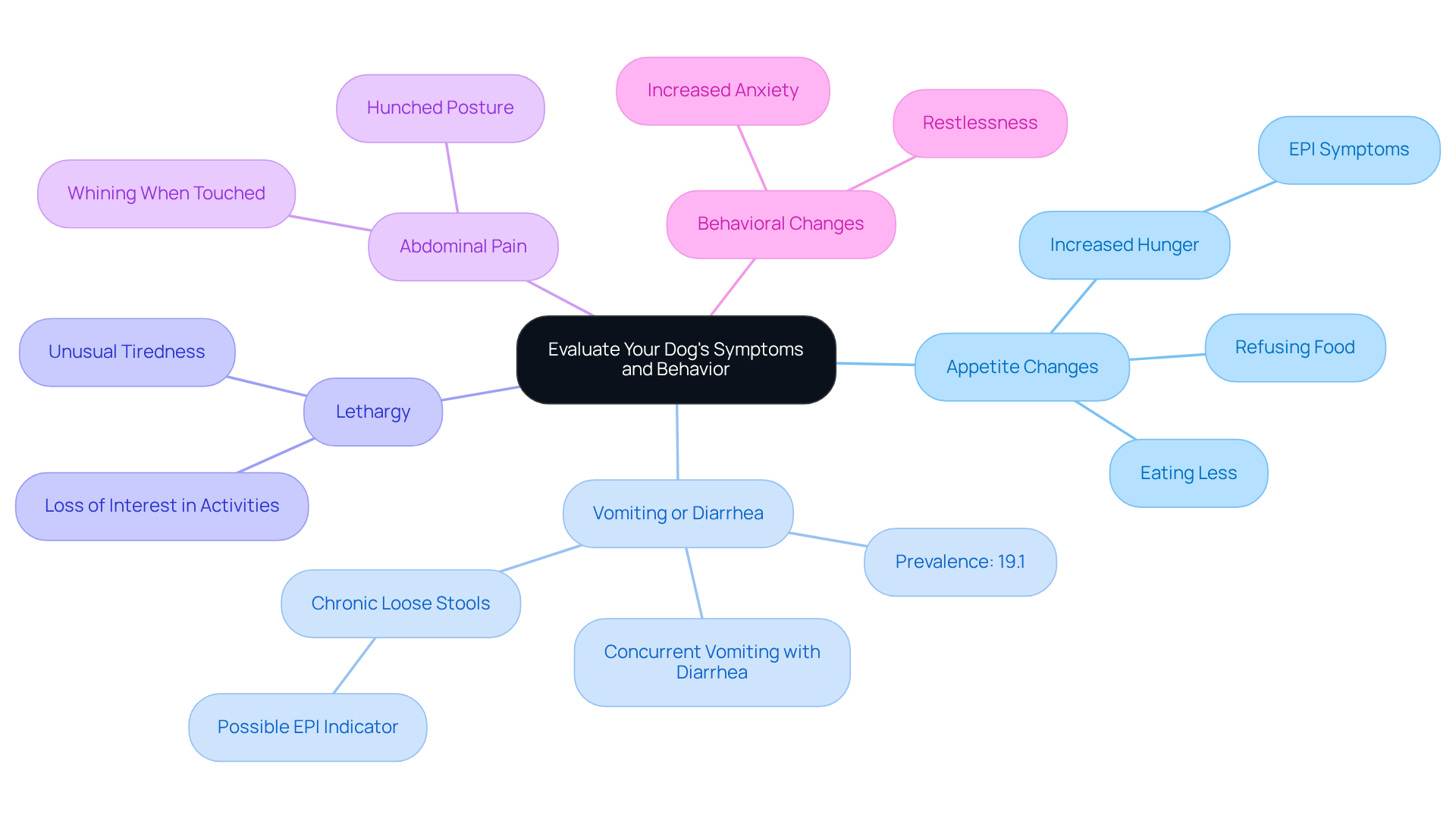
Determine When to Consult a Veterinarian
While dog stomach gurgling in your furry family members can often be harmless, certain signs suggest that a visit to the veterinarian is necessary. As a caring pet owner, consider consulting a vet if your dog exhibits any of the following:
- Persistent Gurgling: If the gurgling continues for more than 12 hours without improvement, it’s time to seek help.
- Severe Symptoms: Accompanying symptoms such as vomiting, diarrhea, or signs of pain should not be ignored.
- Loss of Appetite: If your dog refuses to eat for more than 24 hours, this is a concern that warrants attention.
- Dehydration: Look for signs like dry gums, excessive panting, or lethargy, which can indicate a serious issue.
- Behavioral Changes: Sudden changes in behavior, such as aggression or hiding, can indicate distress and should be addressed promptly.
Prompt veterinary attention can help diagnose and treat any underlying issues effectively, ensuring your beloved pet receives the care they need in a nurturing environment.
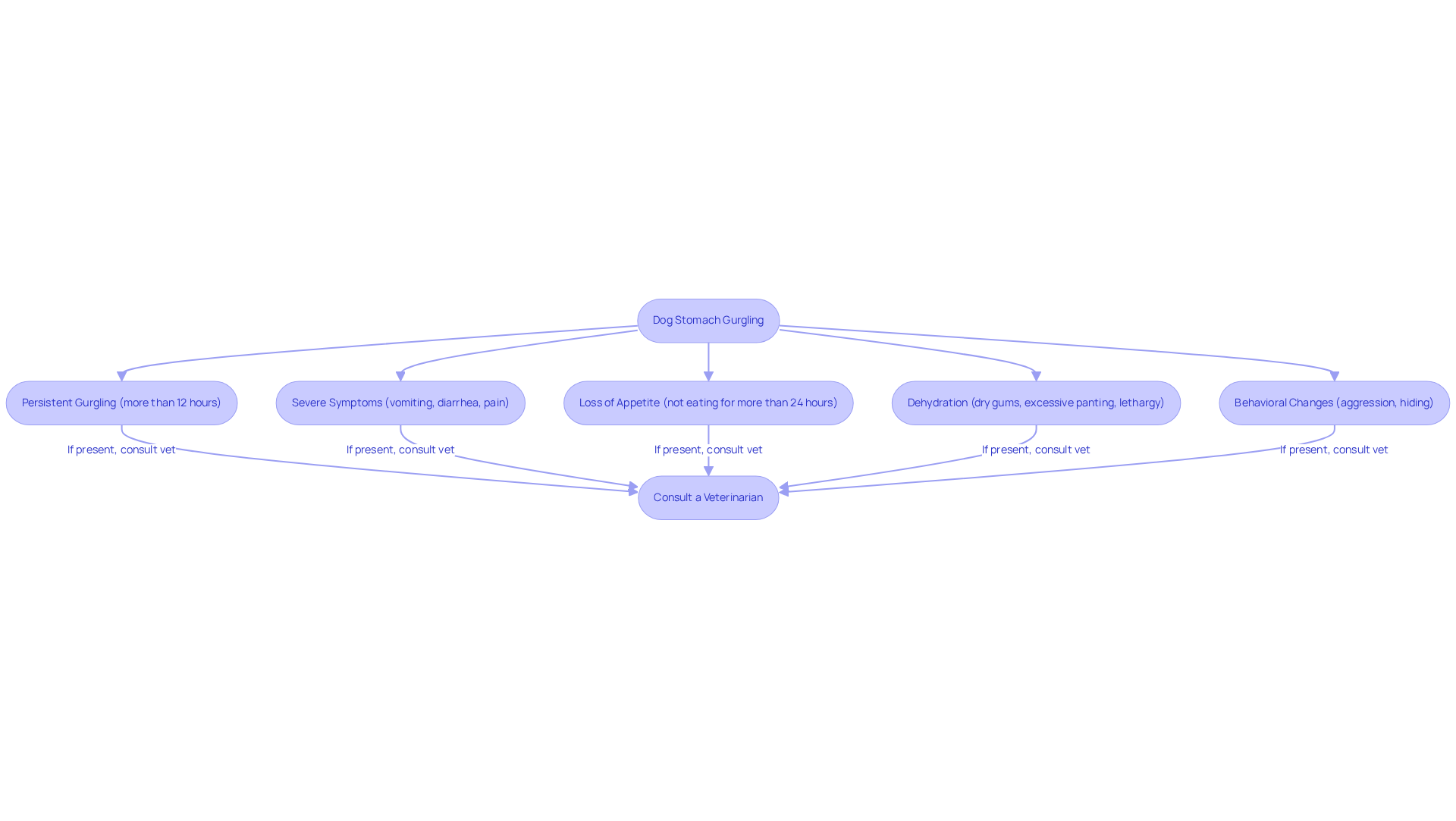
Implement Home Remedies for Mild Stomach Discomfort
If your furry family member is experiencing mild abdominal discomfort, several effective home remedies can help ease the dog stomach gurgling. Let’s explore some gentle options that may bring relief:
- Bland Diet: Consider feeding your dog a bland diet of boiled chicken and white rice. This combination is high in protein, low in fat, and rich in fiber, making it gentle and easily digestible—ideal for canines facing digestive upset.
- Pumpkin: Incorporating plain canned pumpkin (just make sure it’s not pie filling) into your dog’s meals can aid digestion and help firm up loose stools, thanks to its high fiber content.
- Bone Broth: A nourishing homemade bone broth not only provides hydration but also essential nutrients, making it a soothing choice for dogs with upset stomachs.
- Probiotics: Adding canine-specific probiotics to your dog’s diet can restore gut health and balance, promoting better digestion and overall well-being. These supplements are often more effective than human foods like yogurt.
- Hydration: Always ensure your dog has constant access to fresh water to prevent dehydration, especially if they are experiencing vomiting or diarrhea. Providing small amounts of water every 2-3 hours can be quite beneficial.
Always keep a close eye on your dog’s response to these remedies. If symptoms persist or worsen, it’s crucial to consult your veterinarian for further evaluation and care. Remember, your pet’s well-being is our top priority, and seeking professional advice is a loving step towards their recovery.

Conclusion
Understanding the underlying reasons for your dog’s stomach gurgling is essential for every pet owner who cares deeply about their furry family members’ health. This phenomenon, often a normal part of digestion, can also indicate dietary issues or gastrointestinal disorders that deserve attention. By recognizing the signs and symptoms associated with this condition, you can better assess when your beloved companion needs extra care or professional veterinary help.
Throughout this article, we explored key points such as:
- The causes of stomach gurgling
- Evaluating your dog’s symptoms
- Knowing when to consult a veterinarian
- Implementing effective home remedies
Observing changes in appetite, behavior, and physical symptoms can provide crucial insights into your dog’s well-being. Additionally, simple dietary adjustments and natural remedies can offer relief for minor discomforts while ensuring that more serious issues are promptly addressed.
Ultimately, staying informed and proactive about your dog’s digestive health is paramount. By prioritizing regular assessments of their well-being and seeking veterinary advice when necessary, you can foster a nurturing environment that promotes a happy and healthy life for your canine companions. Taking these steps not only enhances the quality of life for your dogs but also strengthens the bond between you and your beloved pets.
Frequently Asked Questions
What is stomach gurgling in dogs?
Stomach gurgling in dogs, medically known as borborygmi, refers to the sounds produced by the movement of food and gas through the gastrointestinal tract.
What are the common causes of stomach gurgling in dogs?
Common causes include normal digestion, hunger, dietary issues, and gastrointestinal disorders.
Does stomach gurgling always indicate a problem?
Not necessarily. Gurgling sounds can indicate normal digestion, but they can also signal hunger or potential dietary issues.
How does normal digestion relate to stomach gurgling?
Gurgling sounds during normal digestion show that food and gas are moving through the gastrointestinal tract, indicating that the dog’s digestive system is functioning properly.
What should I do if my dog’s stomach gurgling seems excessive or unusual?
If the gurgling sounds are unusual or accompanied by other symptoms, it may indicate gastrointestinal disorders that require veterinary attention.
Can dietary changes affect stomach gurgling in dogs?
Yes, sudden changes in diet, low-quality food, or food intolerances can lead to increased gas and stomach gurgling, suggesting a need for dietary adjustments.
What gastrointestinal disorders can cause stomach gurgling in dogs?
Conditions such as inflammatory bowel disease (IBD), parasites, or infections can lead to unusual rumbling sounds in dogs.


